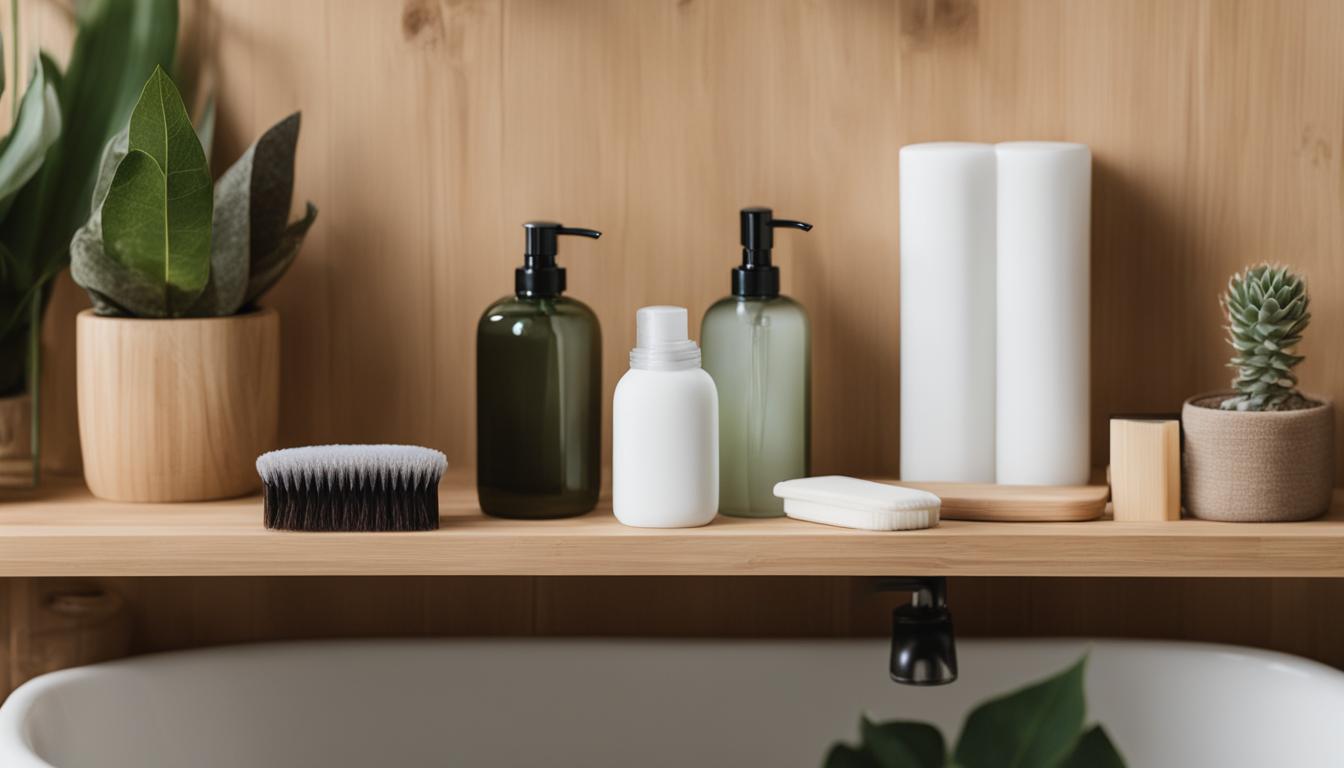Transitioning to a zero waste bathroom is a crucial step in embracing an eco-friendly and sustainable lifestyle. By implementing waste reduction strategies and making conscious choices in our bathroom routines, we can significantly reduce our environmental impact. This guide will explore practical tips and products that align with the principles of Zero Waste Living.
Key Takeaways
- Zero waste bathroom practices contribute to a sustainable and eco-friendly lifestyle.
- Implement waste reduction strategies and make conscious choices in your bathroom routines to reduce environmental impact.
- Explore zero waste alternatives for toilet paper, shampoo and conditioner, soap, and deodorant to eliminate plastic waste.
Zero Waste Toilet Paper
When it comes to achieving a zero waste bathroom, one of the key areas to focus on is toilet paper. Traditional toilet paper not only contributes to excessive plastic waste but also has a significant environmental impact. Fortunately, there are sustainable alternatives:
- Bamboo Toilet Paper: Bamboo is fast-growing and renewable, making it a sustainable alternative to traditional paper products.
- Recycled Toilet Paper: Choosing recycled options helps reduce plastic packaging and conserves resources.
- Bidets: This water-based cleaning method reduces the need for excessive toilet paper usage while ensuring cleanliness and hygiene.
- Reusable Washcloths: These cloths can be washed and reused, significantly reducing waste.
By making these conscious choices, you can contribute to a more sustainable and waste-free washroom environment.

Bottle-Free Shampoo & Conditioner
Traditional shampoo and conditioner often come in plastic bottles, resulting in significant plastic waste. Fortunately, zero waste alternatives can help eliminate plastic packaging:
- Shampoo Bars: Compact, long-lasting bars made with natural ingredients. Ideal for travel.
- Refillable Options: Brands offering refill programs in reusable containers.
- DIY Conditioners: Raw apple cider vinegar diluted with water provides a low-waste conditioning solution.
By opting for these products, you can significantly reduce plastic waste and enhance your sustainable bathroom routine.
Benefits of Bottle-Free Shampoo & Conditioner:
- Reduces plastic waste
- Promotes sustainable hair care
- Compact and long-lasting
Naked Soap Bars for Sustainable Suds
One simple yet effective switch is opting for bar soap over liquid hand and body soaps that come in plastic pump bottles:
- Zero Waste Soap Bars: Brands like Ethique offer bars made with natural ingredients and essential oils.
- Refill Programs: Some stores offer soap refills to further reduce waste.
By choosing bar soap packaged in compostable or reusable materials, you can eliminate plastic waste and promote a cleaner environment.
Deodorant That Keeps Plastic Away From Your Pits
Plastic deodorant sticks are often difficult to recycle, but zero waste alternatives can provide sustainable options:
- Cardboard Sticks: Brands like Ethique offer deodorants in compostable packages.
- Cream-Based Deodorants: Packaged in recyclable glass or metal containers, these options reduce plastic waste and often use natural ingredients.
Switching to zero waste deodorant reduces plastic waste and promotes a greener lifestyle, benefiting both your well-being and the environment.

Conclusion
Embracing a zero waste lifestyle and incorporating sustainable practices into our bathroom routines is essential for reducing waste and protecting the environment. By following the tips shared in this article, you can make a significant positive impact:
- Toilet Paper: Choose bamboo or recycled options.
- Hair Care: Use shampoo bars or refillable products.
- Soap: Switch to bar soap with compostable packaging.
- Deodorant: Opt for zero waste versions in sustainable packaging.
Every small change adds up, helping create a healthier and more sustainable future for ourselves and future generations.
FAQ
How can I transition to a zero waste bathroom?
Transition involves implementing waste reduction strategies and making conscious choices such as using bamboo or recycled toilet paper, shampoo bars, and zero waste deodorants.
What are zero waste toilet paper options?
Bamboo and recycled toilet paper are great alternatives to traditional options, helping reduce plastic packaging and carbon footprint.
How can I reduce plastic waste in my hair care routine?
Switch to shampoo bars, refillable options, or buy from bulk stores. Homemade raw apple cider vinegar also works as a low-waste conditioner.
What are the advantages of using bar soap instead of liquid soap?
Bar soap packaged in compostable or reusable materials eliminates plastic waste. Brands like Ethique offer several options made with natural ingredients.
What are zero waste deodorant options?
Cardboard sticks or cream-based deodorants in recyclable glass or metal containers. Brands like Ethique and EcoRoots provide excellent options.
How can I embrace a zero waste lifestyle?
Make conscious choices such as using zero waste toilet paper, hair care products, soap bars, and deodorants to significantly reduce your environmental impact.
Source Links
- Sustainable Jungle on Zero Waste Bathrooms
- The Eco Hub on Zero Waste Bathrooms
- Zero Waste Store Blog
- Technical Analysis in Crypto: Master the Art of Cryptocurrency Trading - October 1, 2024
- Fundamental Analysis for Crypto - September 30, 2024
- Day Trading vs. Long-Term Investing: Understanding the Dynamics of Cryptocurrency Trading - September 28, 2024






